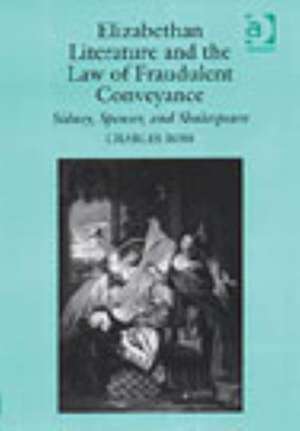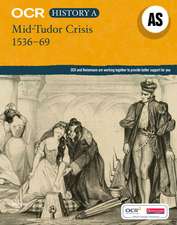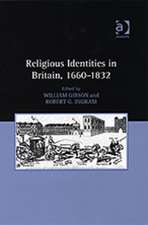Elizabethan Literature and the Law of Fraudulent Conveyance: Sidney, Spenser, and Shakespeare
Autor Charles Rossen Limba Engleză Hardback – 16 iul 2003
| Toate formatele și edițiile | Preț | Express |
|---|---|---|
| Paperback (1) | 449.41 lei 6-8 săpt. | |
| Taylor & Francis – 6 iun 2019 | 449.41 lei 6-8 săpt. | |
| Hardback (1) | 763.78 lei 6-8 săpt. | |
| Taylor & Francis – 16 iul 2003 | 763.78 lei 6-8 săpt. |
Preț: 763.78 lei
Preț vechi: 1027.17 lei
-26% Nou
Puncte Express: 1146
Preț estimativ în valută:
146.16€ • 151.01$ • 121.58£
146.16€ • 151.01$ • 121.58£
Carte tipărită la comandă
Livrare economică 19 martie-02 aprilie
Preluare comenzi: 021 569.72.76
Specificații
ISBN-13: 9780754632634
ISBN-10: 0754632636
Pagini: 168
Dimensiuni: 156 x 234 x 13 mm
Greutate: 0.43 kg
Ediția:1
Editura: Taylor & Francis
Colecția Routledge
Locul publicării:Oxford, United Kingdom
ISBN-10: 0754632636
Pagini: 168
Dimensiuni: 156 x 234 x 13 mm
Greutate: 0.43 kg
Ediția:1
Editura: Taylor & Francis
Colecția Routledge
Locul publicării:Oxford, United Kingdom
Cuprins
Contents: Preface; Introduction; Falstaff's conveyances; 'Creditors and others': the purpose of 13 Eliz. 5 (1571); Carried away in Arcadia; Purchase and consideration in fairyland; Coke, collusion, and Twyne's case (1601); Shylock's penalty; Conclusion; Bibliography; Index.
Notă biografică
Charles Ross is Professor of English and Chair of the Program in Comparative Literature at Purdue University; he is also a lawyer and a member of the Indiana Bar. He is author of The Custom of the Castle from Malory to Macbeth (University of California Press, 1997) and translator of Boiardo's Orlando Innamorato and Statius' Thebaid.
Recenzii
'A fine contribution to recent Law and Literature theory and practice, with intriguing readings of canonical and less well known texts. The application of debtor-creditor law is adept and helpful.' ”Richard Weisberg, Floersheimer Professor of Constitutional Law, Cardozo Law School and author of Poethics: And Other Strategies of Law and Literature 'We need books like this. Charles Ross provides a detailed, attentive analysis of the way great Elizabethan writers respond to what is arguably the most pervasive legal preoccupation of the period. This is an immensely readable study, beautifully written by someone who really understands the law, and”what is even more unusual”has taken the trouble to think deeply about its impact on early modern literature.' ”Erica Sheen, University of Sheffield, UK '... this impressively researched book, broadly innovative in its approach to works of literature, shows how historicist interpretations of Renaissance fictions gain meaning when they are read in light of contemporary statute and case law. It will encourage readers to pursue a more discriminate understanding of representations of power, authority, and statecraft than is possible without an investigation of legal issues.' The Spenser Review 'Elizabethan Literature and the Law of Fraudulent Conveyance combines the study of a very specific legal issue at a particular time with an expansive and metaphorical understanding of that issue such as to show how broadly it was at work in Elizabethan culture. Debt, Ross assures us, is more pervasive than sex and between 1571 and 1601 it functioned as a way of situating sexual a well as other matters in the cultural landscape. This was 'a great age for fraudulent conveyances' and Ross shows us how surprisingly central tot he culture such a practice became.' Renaissance Quarterly '... a book that is fascinating, highly original and persuasive in its interpretation of the interrelations between Elizabethan law practices and the chronicling and interrogating of these processes in the period's literary culture... an important and original work in the growing body of research on the overlapping areas of literary achievement and political history and the added dynamics of early modern law theory and its cultural practice... an academic interested in Elizabethan law should find a wealth of exciting material.' Literature Compass '... a genuinely cross-disciplinary book about fraud and deception, debtors and creditors.' Studies in English Literature '... compelling and insightful... this book deserves attention and serves a useful purpose in both legal and literary studies.' Sixteenth Century Journal '... Charles Ross offers a cogent, carefully researched contribution to this scholarship, exploring thre reasons that laws about fraudulent conveyance dominated English legal and literary discourses between 1571 and 1601... This is an erudite study, and Ross makes a strong case for his claim that between 1571 and 1601, 'the connection between the rights of creditors and the needs of the Crown created a broad field of play for Sidney, Spenser, and Shakespeare.' Clio
Descriere
This book investigates the origins, impact, and outcome of the Elizabethan obsession with fraudulent conveyancing, the part of debtor-creditor law that determines when a court can void a transfer of assets. Focusing on the years between the passage of a key statute in 1571 and the court case that clarified the statute in 1601, Charles Ross convincingly argues that what might seem a minor matter in the law was in fact part of a widespread cultural practice. Debt was more pervasive than sex, at least in the English Common Law. Ross examines how during the thirty years in which the law developed, Sidney, Spenser, and Shakespeare wrote works that reflect the ethical problem of crafting fair laws against fraudulent conveyancing, which was practiced by unscrupulous debtors but also by those unfairly oppressed by power. This study connects a major development in the law to the literature of the period, one that makes a contribution not only to the law but to literary studies as well as political and social history.













